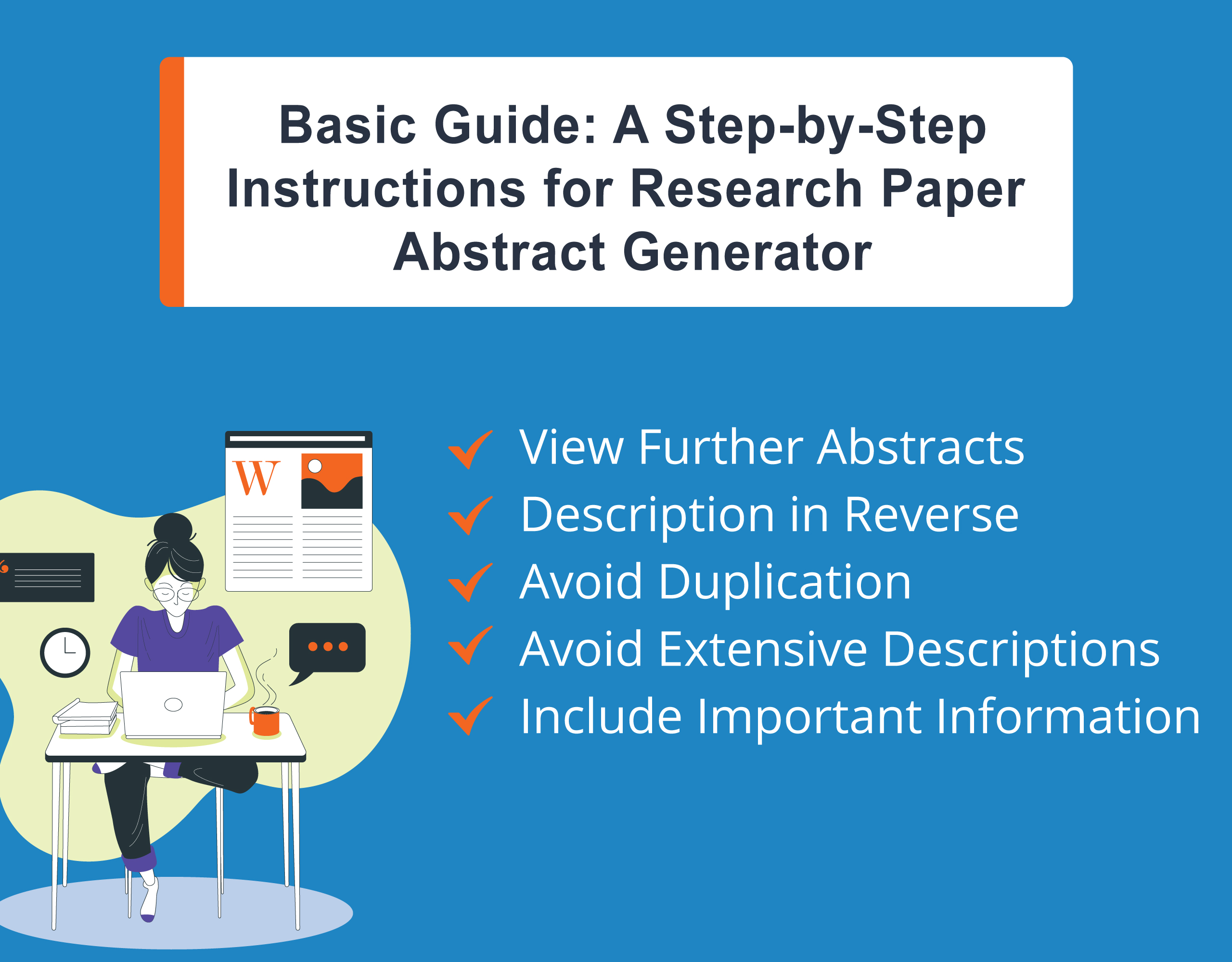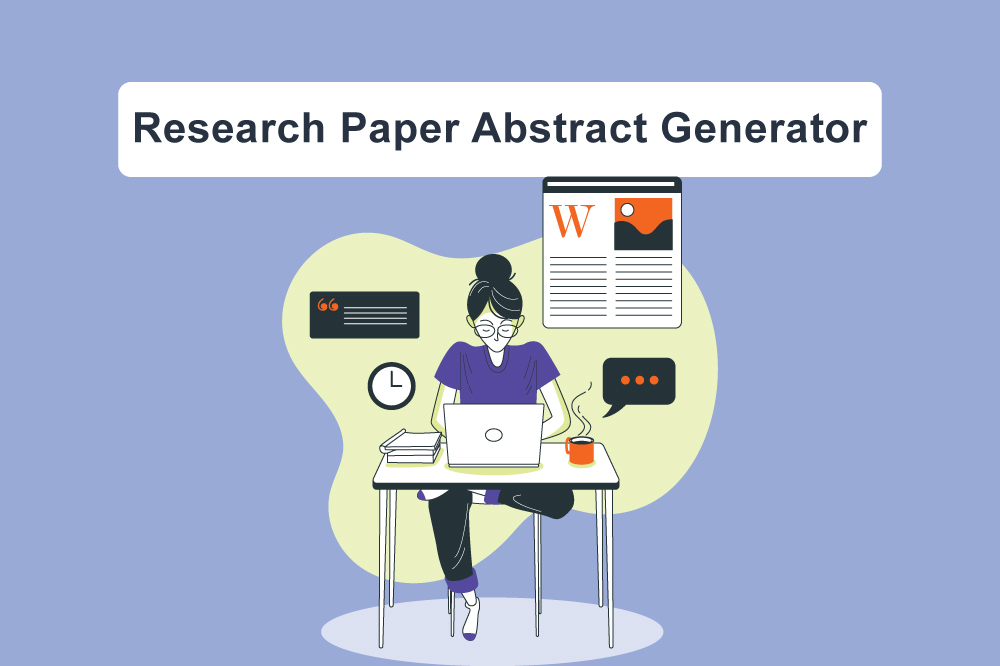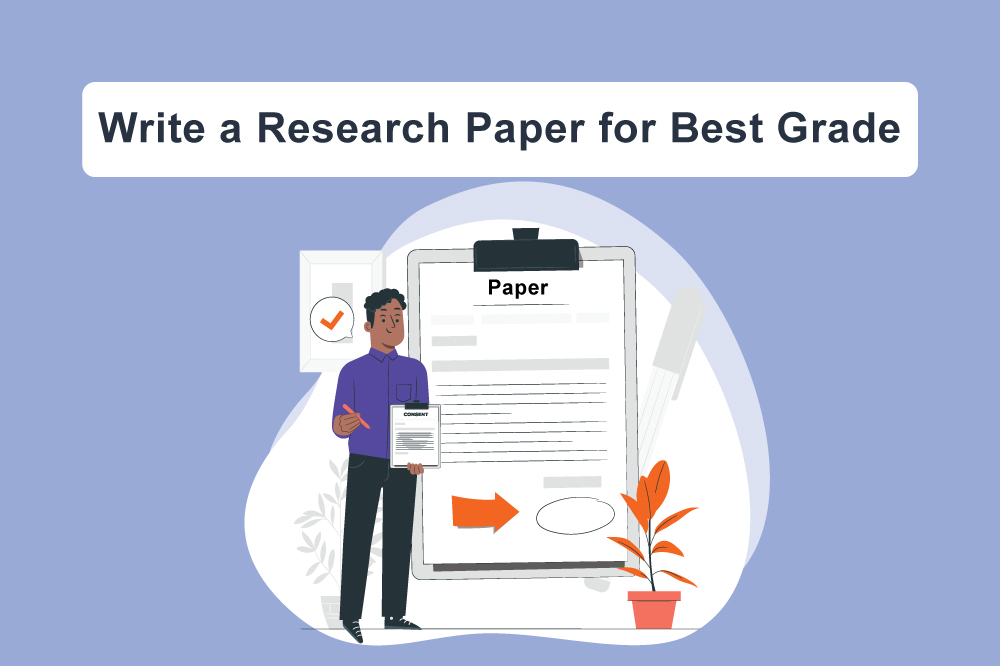The abstract of a research paper provides a key summary of your paper. They give the reader a summary of your paper; however, the majority of individuals are terrified of writing this essential section.
Why? It may determine the success or failure of a paper.
Would you like to present at a conference? You must include an abstract with your application, and it must pique the reviewers’ interest. When you submit your paper for grading or present the field in which you worked with your most recent study, your abstract must be as strong as possible.
Although it may appear scary, especially if this is your first time, we have provided you with information on what abstracts are and basic instructions on how to write abstracts for a variety of scenarios.
What Is a Research Paper Abstract Generator?
Using superior AI technology, the abstract generator enables you to compose an abstract for your research paper. The free abstract generator generates a title and precise description of the material given with a single click. The research paper abstract generator generates an acceptable research paper abstract by including the most pertinent and essential phrases from the paper’s body.

What Is An Abstract?
Let’s define an abstract prior to entering the abstract domain.
An abstract is a succinct and unambiguous overview that comprises your hypothesis, the context of your study, a sentence or two describing your methodology, and your conclusion. It provides viewers with a preview of your work and helps them decide whether to read it. Consider it a more in-depth book summary or movie trailer! Including all of this essential information enables others to acquire the knowledge they need for their professions fast. Importantly, your abstract should be concise; you should aim for between 100 and 500 words. Aim for around 300 words for an exact word count.
Your abstract is not an expansion or evaluation of your research work, nor is it a criticism or suggestion. Its purpose is to explain your article. When submitting your work for evaluation, publishing, submission to a regulatory body, or permission to speak at a conference, you are typically expected to produce an abstract. Consequently, your abstract must contain a great deal of information. Refrain from believing that a single notion will suffice in all of these circumstances.
Writing an Abstract
You may be tempted to write your abstract first because it will be the first section of your paper, but it’s better to wait until you’ve done your entire project so you know exactly what you’re summarizing. If you are writing an abstract for a course paper, your professor may provide you with precise guidelines on its content and structure. Similarly, scientific publications often adhere to stringent abstract standards. In addition to following the directions on this page, you should look for and adhere to any rules from the course or publication for which you are writing.
The Structure of a Research Paper
Willing to examine scientific publications, evaluate several studies, and even learn how a research paper summary tool operates? In this case, you will be inquisitive about the structure of such academic papers. Here, we have just described the normal format of scholarly papers.
Include the following sections in your research paper:
-
Abstract
The abstract of a research paper provides a summary of the research project. It emphasizes the premise and noteworthy findings. Your audience will utilize it to comprehend the overall concept and purpose of the study rapidly. Utilize our online summary generator for this section. Abstracts in scientific works are often one paragraph at maximum.
-
Introduction
In the beginning, you should situate your study subject. Describe the subject and include any pertinent earlier research. Additionally, this is where you would typically outline a knowledge gap you wish to address. Explain why the topic you are addressing is significant and requires more examination.
-
Methodology
In this part, you must describe the study’s methodology. Describe how the research was conducted and who was involved. Describe your methodology as well as the materials and technologies employed. You must also outline the data collecting and analysis procedures. It is essential to remember that someone else should be able to duplicate your study using these ideas.
-
Findings
In the results portion of your research report, you will provide the collected data. You must also include the findings of any statistical tests you conduct. Keep in mind the main research questions throughout this strategy. In this area, you should relate your findings to it.
-
Discussion
Explain the relevance of your methodology and results once you have completed your report. Discuss the consequences of the most significant components of your study. Consider your topic and your objectives for the research. Discuss its flaws and how they can be addressed in the future.
-
References
The final portion of your work is a bibliography also known as references. It is a list of the sources you consulted for your paper. It should be formatted according to your school’s specifications. Ensure that things are organized alphabetically.
Instructions for Writing an Abstract
It may take a great deal of effort to condense your whole work into a few hundred words, but the research paper abstract will be the first (and often only) item that people read, so it is crucial that it be written correctly. These tips can help you get started.
-
View Further Abstracts
Reading the abstracts of others is the best approach to learning how to write an abstract on your topic. Consider utilizing journal article abstracts as a model for organization and style, as you have likely read hundreds of them while performing your research review. Thesis and dissertation databases also provide hundreds of samples of dissertation abstracts.
-
Description in Reverse
Not all abstractions will include identical components. For lengthier works, write your abstract in reverse outline format. Each chapter or section should include a list of keywords and a one- to a two-line summary of the major point or argument. This will serve as a guide for the organization of your abstract. Then, modify the phrases to establish connections and illustrate how the argument develops.
-
Write Effectively and Concisely
An effective abstract is concise and persuasive, so ensure that every word counts. Each sentence should elaborate on a significant point.
-
Passive Expressions Must Be Avoided
Frequently, passive construction should be shorter. Employ the active voice to make them shorter and more comprehensible.
-
Avoid Using Obscure Jargon
The abstract should be understandable to those unfamiliar with the subject matter.
-
Avoid Duplication and Filler
Replace nouns with pronouns wherever feasible and avoid using unneeded words.
-
Avoid Extensive Descriptions
The purpose of an abstract is not to provide detailed definitions, context, or commentary on the work of other scholars. Instead, provide this material in the body of your dissertation or paper.
-
Investigate Your Formatting
If you are writing a thesis or dissertation or submitting to a publication, the abstract must be structured exactly; be sure to adhere to the instructions and prepare your work accordingly. APA research papers may utilize the APA abstract format.
-
Only Copy Complete Phrases from Papers
In theory, it may appear to be a great strategy, but in practice, it will just bring you headaches. You will need more than just using terminology from your work to write a clear, accurate, and succinct abstract. This will prevent your abstract from becoming an actual abstract and will likely make it illogical.
-
Include Important Information
You must include the required information in your abstract to be accepted.
-
Avoid Adding Too Many Details
To qualify the preceding point, it is also a major no-no to provide too much information in your abstract. Finding the optimal balance might be challenging; thus, your abstract should be clear and transparent. Remove unnecessary phrases and terms that “fluff up” your research.
-
Your Abstract Is What Piques the Reader’s Curiosity
Unfortunately, they only have time to read your entire paper, especially in the case of conference submissions. The readers want to know if your work will aid them with their study or if it is the appropriate piece for their conference.
What Makes A Bad Abstract?
-
Not Following Abstract Structure Directions
If you have been informed of the structure and format that the institution to which you are submitting your abstract requires, adhere to it precisely. Remember to include everything, and do not assume that if you miss one small detail, it will not matter because it will!
-
Omission to Include Important Keywords
In order for your abstract/paper to be effectively indexed and easily discoverable, you must include keywords.
-
Not Offering an Exhaustive Overview
You must provide a brief description of each section of your work. You’ve included the results, but if you have an introduction, method, outcomes/results, and analysis/discussion, you must summarize them all in your abstract.
Online Services for Abstract Writing
Researchers devoted a number of hours to ensuring that their investigation was conducted thoroughly and precisely that all approaches and new discoveries were examined, and that every minute observation was recorded.
So, when it’s time to publish your work, how can you condense your research into a concise essay that satisfies the Journal’s stringent requirements without sacrificing essential information?
You have access to a number of online abstract writing services. These services will condense your whole material without compromising vital details or the effectiveness of your work. These online writing services will also ensure that the content flows logically and is accessible to a wide variety of readers. Your abstract will also contain potent keywords that will increase your database search results.
Conclusion
Research paper abstracts are an excellent way for summarizing your study for your audience. It describes the nature of the inquiry, the methodology employed, and the results. Consider refining your academic writing abilities in order to excel in your abstract. In addition, despite the fact that writing an abstract may first look tough, if you follow the guidelines provided above, you should find the process easier and more fun.
Frequently Asked Questions
-
How to write a good research paper abstract?
An abstract should be able to be understood without reading the full article or consulting any other resources. It emphasizes important subject areas, the purpose of your research, the relevance of your work, and the primary conclusions.
-
How do I start an abstract research paper?
The abstract should begin with a brief yet precise statement of the problem or topic, followed by a discussion of the research methods and methodology, the noteworthy results, and the conclusions reached.





